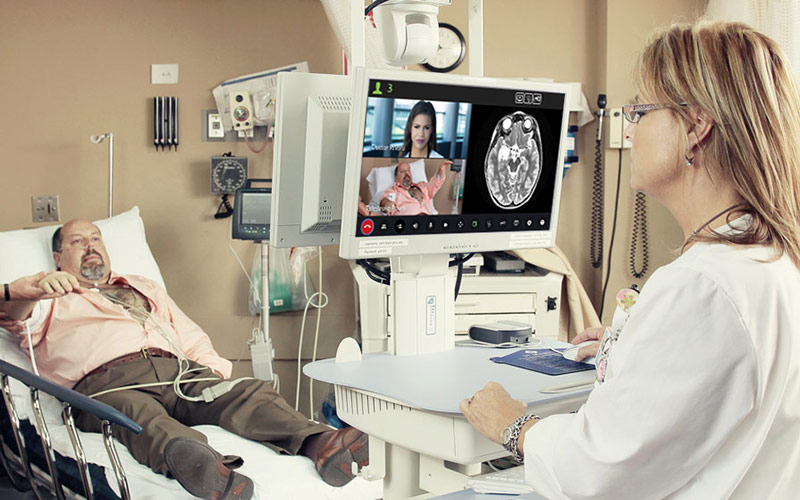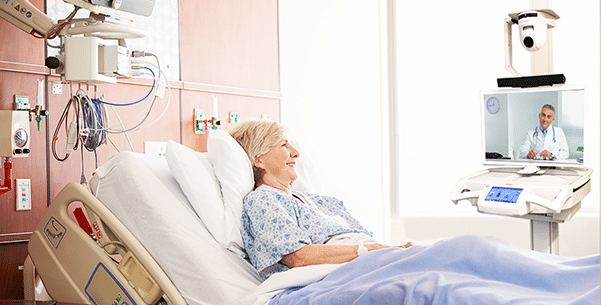Preventing Hospital Patient Falls with Bedside Medical Carts and Virtual Sitters
According to the National Library of Medicine, between 700,000 and one million patients fall while in the hospital in the U.S. annually, resulting in nearly 250,000 avoidable injuries and up to 11,000 deaths. Not only do these falls pose an acute risk to patients – especially those predisposed to falls and everyday injuries – but they also represent a significant monetary threat to hospitals. Non-fatal patient falls cost U.S. hospitals over $50 billion a year, with fatal falls resulting in a net cost of $754 million. As such, hospitals lose billions to an avoidable issue, money that could instead go toward hospital renovations, research and innovation, and patient care.
A growing concern
According to the U.S. Census Bureau, one in every five U.S. citizens will be aged 65 or older by 2030, with this age group outnumbering those under 18 by 2034. By this metric, in the coming years, the average patient population will likely contain more individuals aged 65 or older. These individuals have been shown to have a fall probability of 27%, caused in part by poor balance, hearing, and eyesight common in elderly individuals. Moreover, older individuals are more likely to be severely injured by falls than their younger counterparts; in the U.S., 20-30% of patients 65 and over who fall sustain moderate to severe injuries, including but not limited to head injuries, contusions, and hip fractures, as well as other forms of trauma.
Due to the age-related nature of falling, hospitals and their patients will continue to be at a heightened risk of fall-related injuries and costs in the coming years. Not only do older patients have a larger probability of falling, but they are also more likely to be injured as a result of these falls than younger individuals.

Success story
A large health system serving more than six million residents in the Chicago area needed a way to centrally monitor patients at risk of falling. They chose to partner with VidyoHealth for its Medical Cart and VirtualSitter solutions.
VidyoHealth’s Medical Cart, with an easy-to-use video interface, allows for continuous patient monitoring without requiring a medical professional to be in the room. This tool can be used for virtual rounds and continuous observation, with built-in digital stethoscopes, as well as other relevant telemedicine technology such as VidyoHealth’s VirtualSitter—a turnkey solution that connects clinicians and patients within an in-patient setting.
The health system engaged nursing leaders and bedside nurses to collaborate in the clinical design process. They leveraged inclusion and exclusion criteria and integrated existing fall risk screening tools into the program. They also created clinical validation processes and a customized dashboard.
Each patient entering the facility receives a fall risk screening. If they meet the criteria, the patient is enrolled into the program and a medical cart enabled with VirtualSitter is set up in the room. Once the patient is settled, the bedside nurse communicates vital information to the VirtualSitter clinician. The VirtualSitter clinician introduces themselves to the patient and instructs them on how VirtualSitter works and that it’s there to keep them safe.
Since implementing VirtualSitter seven years ago, the health system has seen no falls with injury at any of its acute care sites.
Leveraging VidyoHealth’s Medical Cart and VirtualSitter solutions, the health system was able to design a customized program to create a scalable, sustainable model that has delivered significant outcomes. The health system has been nationally recognized for its innovative program that leverages “VirtualSitter” technology to monitor patients at risk of falling.
A new solution for Patient Falls
Patient falls are a significant challenge for hospitals and health systems—a challenge that is likely to grow in the coming years as our nation ages. The good news is that most patient falls are preventable. Hospitals can more effectively intervene to prevent patient falls with simple tools that are easy to implement, like VidyoHealth’s Medical Carts and VirtualSitters. The result is improved outcomes, reduced risk of financial liability, and better patient experience.

Recent Comments